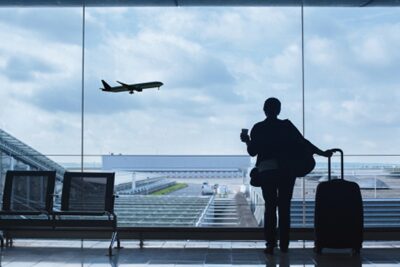 Currently valued at over AUD$3.8 billion1, the business travel industry in Australia sees Aussies spend an average of three and a half nights away each trip2. With over half (59%) of businesses expecting to make even more business trips in 2024 compared to 20233, it is evident the number of workers taking flight for work will only continue to grow.
Currently valued at over AUD$3.8 billion1, the business travel industry in Australia sees Aussies spend an average of three and a half nights away each trip2. With over half (59%) of businesses expecting to make even more business trips in 2024 compared to 20233, it is evident the number of workers taking flight for work will only continue to grow.
However, health professionals warn of the impact constant business travel may have on Australia’s busy and high performing workforce, with nearly half of Australia’s business travellers aged over 454.
The mental impact of working in a management position can be profound, with new data from The Banyans Healthcare revealing over half (55%) of Australian managers say work has negatively impacted their mental health – compared to only one in three (32%) non-managers. Compounding already stressful work with irregular sleeping hours, jet lag, social isolation from family and pressures to eat and drink in excess, frequent business travel can pose health risks for those in senior positions.
Research highlights the link between frequent travel and prolonged stays away from home with these health risks. In fact, business travellers exhibit higher rates of disturbed sleep, sedentary lifestyle, alcohol dependence, anxiety and depression5.
Founder of The Banyans Healthcare, Ruth Limkin, explains that there’s unique challenges faced by those who regularly travel for work.
“While on-site workers may be able to make positive steps towards improving their mental health through implementing simple daily routines, business travellers may struggle to hold to steady habits to buffer the adverse effects of work on their mental health. This is especially true when working away involves committing free time to work associated activities such as being in transit or meetings over dinner,” says Ms Limkin.
General Manager at The Banyans Healthcare, Marian Cartwright, adds that a healthy routine is an integral aspect of recovery from mental illness and can also act to lessen the severity of symptoms, or even prevent the onset of mental illness.
“Good sleep, physical activity, social connection and support, a healthy diet and mindfulness are the building blocks to maintain good mental health – however, frequent business travellers are often unable to build these activities into their travel routine,” says Cartwright.
“When you lack a kitchen to prepare your own food, are facing long flights and jet lag or working to a busy schedule with few breaks, it becomes increasingly difficult to find the time to prioritise mental health. The chronic stress of working on the go and not having a proper, structured place where you can rest, reset and recover will inevitably catch up with you, unless people implement proactive strategies to mitigate the impacts.”
Striking the balance between work and life can be difficult for all Australians, however it is a crucial skill for regular travellers to master.
“Working with hundreds of individuals who travel frequently for work, I have seen first-hand the effects that the non-stop lifestyle of business travel can have. The effects of disturbed sleep, improper diet, social isolation and burnout on our mental health are profound, and the very nature of travelling for work can easily compounds these issues, with little opportunity for reprieve,” Ms Limkin says.
“At The Banyans, we work closely with high performing individuals through our day programs and high performance resets, and prioritise working with these individuals holistically to build routines and habits to alleviate the health impacts of senior management work – including frequent travel.”
For Australian workers caught between hotels and home, Ms. Limkin has reflected on her own experiences travelling, as well as her work with other business leaders, to develop:
The Banyans’ CEO on the Go Wellbeing Strategies:
- Build mindfulness into your day –Try taking five minutes at the start or end of the day to journal, practice breathing on a balcony or meditating before bed.
- Prioritise sleep as much as you can – Ensure you are having quality sleep by avoiding caffeine or alcohol late into the evenings and keep the hotel room as dark and cold as possible to promote sleep. Ask the hotel to empty the minibar to remove temptation which can be harder to resist when tired and lonely.
- Make breaks to be in the sun – Research has shown the positive correlation between sunlight and mental health symptoms6. Make time to step outside between meetings and conferences.
- Use the space available as best as you can – We know that exercise can reduce symptoms of mental illness, as well as improve sleep, concentration and energy7. Do yoga in your hotel room, use the hotel gym – even if it’s late at night for 20 minutes on the treadmill. Adopt a ‘something is better than nothing’ mindset and take a quick walk through the city, or even just between desks or around the airport to get moving.
- Stock up on healthy snacks – If you pre-prepare and pack protein bars, nuts and low sugar treats you can eat these instead of the often unhealthy options available at meetings and events like high carb pastries or sweet desserts. Staying hydrated by drinking water or herbal tea will also help mental alertness.
Proactive wellbeing strategies are crucial to mitigating the mental health detriments associated with corporate travel and maintaining senior management wellbeing. As business travel rates continue to rise, The Banyans Healthcare is encouraging Australians to take steps to improve their wellbeing as they jet across the country. For more information, including practical tips to boost your overall wellbeing visit thebanyans.com.au.




















